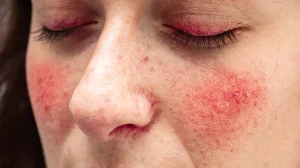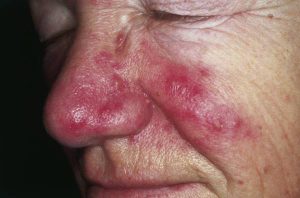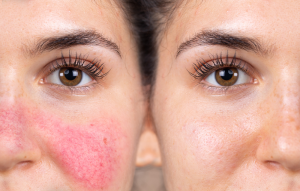
ROSACEA
Rosacea. The chronic inflammatory skin disorder known as rosacea typically first appears in people between the ages of 30 and 60. It primarily affects the middle face. The common condition known as rosacea is characterized by a persistent redness of the face. Symptoms are usually managed with lifestyle changes, general skin care, medication, and procedural procedures. It usually has a relapsing and remitting course.
ROSACEA
Meanwhile, one kind of rosacea that arises as a side effect of prolonged antibiotic usage, especially for acne, is gram-negative rosacea. A flare-up of pustular or cystic lesions is its defining feature, and resistance to common acne treatments is frequently present as well. Gram-negative bacteria are the cause of the infection, which manifests as numerous microscopic yellow pustules that are clinically comparable to stage II or III rosacea.
Causes

Genetic vulnerability
association with class II major histocompatibility complex-related single nucleotide polymorphisms.
Changes in the gut and skin microbiome
However, skin inflammation may be caused by Helicobacter pylori infection, bacterial overgrowth in the small intestine, and a rise in the density of Staphylococcus epidermidis and Demodex folliculorum on the skin. Excessive inflammation, vasodilation, lymphatic dilatation, and angiogenesis can result from immune response dysregulation.
Mechanisms of the neurocutaneous
Also, ultraviolet (UV) radiation, temperature changes, physical activity, spicy meals, alcohol, mental stress, air pollution, and tobacco use are all triggers. CGRP, or calcitonin gene-related peptide, may be involved in erythema and flushing.
compromised skin barrier
Affected skin exhibits characteristics that point to a compromised skin barrier, which permits inflammation and bacterial colonization.
Treatment

Lifestyle guidance
To help identify triggers, encourage patients to keep a symptom diary:
Spicy food, hot or cold temperatures (hot baths), physical activity, exposure to the sun, cosmetics, drugs (including those that promote vasodilation), alcohol, fruits and vegetables, dairy products, and items made from marinated meat are common triggers.
Steer clear of the identified triggers.
General tips for skincare
However, regularly moisturize, Make use of mild OTC cleaners. Because of the possibility of irritation, use gentle, synthetic detergent-based cleansers instead of conventional soaps. Use physical sunscreens (such as zinc oxide or titanium oxide) with an SPF of at least 30. These offer protection against visible light and broad-spectrum UV radiation and may be more tolerable than chemical sunscreens.
Steer clear of exfoliant, Steer clear of topical treatments with alcohol.
Steer clear of topical steroids as they can make the issue worse.
Also, green-tinted cosmetics can help reduce the look of redness.
Psychosocial factors
Although, determine the emotional impact of the patient’s illness and, if required, think about referring them for psychological assistance.
Particular actions
However, the current treatments for rosacea can be quite successful, they sometimes only address one aspect of the condition. This indicates that patients with severe rosacea and those who present with numerous characteristics need a mix of medications.
Summary
Also, rosacea is a chronic disorder that necessitates long-term therapy of recurrent and remitting symptoms, despite not being a life-threatening condition. It has been demonstrated that full resolution of clinical characteristics has a stronger beneficial influence on quality of life than partial resolution and lengthens the period before symptom return.
Pingback: face serum: choosing the right one for your skin type
Pingback: face exfoliations: the right one for you